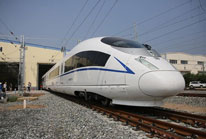

I recently took a taxi with my friend, Lin and when we got to our destination on the outskirts of Beijing, he reached for his phone (not his wallet), pressed a few buttons and it was done.
In an instant, Lin had paid the fare using Wechat pay, a payment service carried on Wechat, arguably the most popular mobile app in China today.
Such a platform is testament to what the internet is doing in China, where it is creating a seamless world of possibilities for more than 1.3 billion people.
With more than 700 million people online (netizens), the rapid rise of the internet and the growing number of smartphone users has led to a surge in home-grown tech innovations.
In the year 2015, there were 913 million smartphones in China, according to a study by the Groupe Spécial Mobile Association (GSMA). It is estimated that there were as many smartphone users in China as all European countries combined.
For the ordinary people in China, internet and the smartphone are transforming the social, cultural, economic and political space, building and altering their way of living.
Wechat and Alipay QR codes in a shop in Beijing
Communication
Traditional cell phone carriers are taking a hit as subscribers turn to instant messaging apps to make calls or send text using free mobile apps hold ground.
Voice-over internet calls are cheap; all it takes is just a good internet connection and smartphone with 3G or 4G capabilities to make decent calls.
Apps like Wechat, which has over 650 million users, not only support chat platforms but also features such as voice or video calls and micro-blogging.
Gilly, a Chinese student on an exchange programme in Australia stays in touch with her family and friends, many miles away from home, using Wechat.
“Whenever I feel lonely, I chat with my family and friends on Wechat and it feels like they are all around me,” says Gilly, who also regularly uses Weibo and QQ.
The two mobile apps are among top instant messaging service providers that command a large following among smart phone users and have become integral to the lives of many people.
Banking
Early in April, I walked into one Bank of China branch in Beijing and was surprised there were no tellers. Just a couple of machines in one corner. I was told this branch was a ‘self-service center.’
The long queues in banking halls are almost gone, and so are paper transactions. All you are to find in most banking halls are just a few seats, some of them spared for elderly clients. Some banks are even closing branches as online banking and mobile banking take over.
“You can now transact online, wherever you are at anytime,” says Luo, an agent at Standard Chartered Bank in Beijing, who reveals that online transfers attract no fees.
File Photo
E-commerce
It appears everyone in China is shopping online. From trinkets to electronics, online retail markets are changing the way people transact in China.
E-commerce transaction value was estimated to hit 20.8 trillion yuan in mainland China alone in 2015, Xinhua quoted Commerce Minister Gao Hucheng as saying.
The online retail market is now dominated by business-to-consumer and consumer-to-consumer retail giants, with Taobao, Tmall, Suning and JD being some of the popular sites.
Workers work at a warehouse of an intelligent distrbution center of Chinese e-commerce trader JD.com in Gu'an, north China's Hebei Province, June 14, 2016. The logistic working staff of JD.com are preparing for its "618" online shopping festival which is an e-commerce sales promotion activity around June 18, 2016. (Xinhua/Chen Yehua)
One of the endearing attributes of online retail markets is that their prices tend to be relatively lower than those of traditional shopping outlets and goods are delivered to your doorstep.
The integration of internet with commerce has given rise to new payment systems, enabling people to transact, creating a cashless society.
For instance, with Alipay, one can pay their electricity bills, shopping expenses and pay traffic fines. Customers simply scan the QR Code on their mobile phone to pay.
Using Wechat, one can book doctor appointments, order for food and pay for groceries. With competition brewing between respective parent firms Alibaba and Tencent, Alipay and Wechat payment systems can be found at retail shops and in big shopping malls.
 |
 World's fastest bullet train to start operating next month
World's fastest bullet train to start operating next month Huangluo: China's 'long hair village'
Huangluo: China's 'long hair village' Spectacular bridge with one of the tallest piers in the world
Spectacular bridge with one of the tallest piers in the world Magnificent view of Hukou Waterfall
Magnificent view of Hukou Waterfall A glimpse of Stride 2016 Zhurihe B military drill
A glimpse of Stride 2016 Zhurihe B military drill US Navy chief tours Liaoning aircraft carrier
US Navy chief tours Liaoning aircraft carrier Chinese American woman wins Miss Michigan
Chinese American woman wins Miss Michigan Centenarian couple takes first wedding photos
Centenarian couple takes first wedding photos Traditional Tibetan costumes presented during fashion show
Traditional Tibetan costumes presented during fashion show Top 10 livable Chinese cities
Top 10 livable Chinese cities Top 20 hottest women in the world in 2014
Top 20 hottest women in the world in 2014 Top 10 hardest languages to learn
Top 10 hardest languages to learn China’s Top 10 Unique Bridges, Highways and Roads
China’s Top 10 Unique Bridges, Highways and Roads Stop politicizing doping: observer
Stop politicizing doping: observer Weibo explodes over news of actor’s divorce
Weibo explodes over news of actor’s divorce Japanese teacher spends decades researching Nanjing Massacre
Japanese teacher spends decades researching Nanjing Massacre After 2 years of regulatory limbo, govt to legalize popular QR code payment services
After 2 years of regulatory limbo, govt to legalize popular QR code payment servicesDay|Week